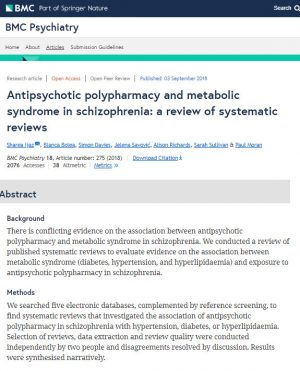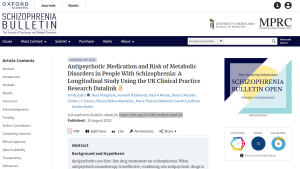Understanding the physical harm of taking more than one antipsychotic drug for schizophrenia
Schizophrenia is a serious mental illness that affects about one per cent of people. The most common treatment people start with is a type of drug called an antipsychotic.
Antipsychotics are divided into two groups: first-generation (older) antipsychotics and second-generation (newer) antipsychotics. Whether an antipsychotic is ‘first’ or ‘second’ generation depends on when it was developed and how it works in the brain.
Many patients are prescribed more than one antipsychotic at a time, even though treatment guidelines don’t recommend this. There is no evidence that taking more than one at a time is more effective in treating schizophrenia.
People with schizophrenia die about 20 years earlier than those without a serious mental illness, partly because they are more likely to have additional preventable health problems such as obesity, diabetes, high blood pressure and high cholesterol. All these conditions increase the risk of having a heart attack or stroke. Over a long time, taking more than one antipsychotic may increase the chance of having these problems (although there is no clear evidence.)
Project aims
We wanted to find out whether taking more than one antipsychotic drug increases the chance of having serious physical health problems.
What we did
The project had two parts:
- We looked at reviews of existing research on the relationship between taking more than one antipsychotic and high blood pressure, diabetes or abnormally high blood fat levels.
- We analysed existing data on a large group of people with schizophrenia collected from GP surgeries, to find out how many antipsychotic drugs they are prescribed, and if being prescribed more than one gives them a higher risk of health problems. These health problems included diabetes, high blood pressure and abnormally high levels of fat in blood.
What we found and what this means
Reviews of existing research
We found 12 systematic reviews of existing research, but the evidence they provided was low quality, so the findings weren’t reliable.
Most of the reviews included clozapine, a commonly prescribed antipsychotic which is used when a patient doesn’t respond to other antipsychotics.
There was some indication that drug combinations with aripiprazole (a second-generation antipsychotic) can protect against diabetes and high blood fat levels, compared to combinations without aripiprazole or single drug therapy. But we can’t be sure because the data was from a few small studies. The only evidence on high blood pressure was from one low quality review, which said taking more than one antipsychotic drug didn’t increase the risk of high blood pressure.
Most people with schizophrenia are treated by their GP, with only severe cases being treated in hospitals or specialist centres. None of the reviews separated results for patients treated by their GP from those treated in hospital.
With the existing evidence, we can’t be sure if taking more than one antipsychotic drug is effective or safe for most schizophrenia patients.
Routine GP data analysis
To carry out this part of the study, we looked at data provided by the UK Clinical Practice Research Datalink (CPRD). The CPRD collects anonymised patient data from a network of GP practices across the UK.
We reviewed the records of more than four thousand patients diagnosed with schizophrenia and registered at a GP practice between 1 July 1994 and 30 August 2018. We chose such a long study period to make sure we had enough data for our analysis and to account for changes in how drugs are prescribed over time. This is because new drugs and/or new studies may change common patterns of drug prescription.
During the study we examined potential links between patients being prescribed more than one antipsychotic and developing any of the following:
- Diabetes
- High blood pressure
- Abnormally high levels of fat in the blood
For those patients who were prescribed more than one antipsychotic, we also looked at whether they were taking first or second-generation drugs. This is because we thought it was possible that people who were taking only first-generation (older) drugs could experience different outcomes to people who were only taking second-generation (newer) drugs or those taking a combination of both.
We did not find evidence to suggest that taking more than one antipsychotic at a time increased a patient’s risk of developing diabetes or abnormally high levels of fat in the blood a. Patients treated with multiple (more than one) antipsychotics at the same time had a higher risk of developing high blood pressure than patients treated with only one antipsychotic.
There was no evidence of a change in a patient’s risk for developing diabetes or abnormally high levels of fat in the blood when we compared combinations of first- and second-generation antipsychotics. However, we did find that the risk of developing high blood pressure was lower for those taking a combination of first and second-generation antipsychotics, when compared to those taking only first-generation drugs.
Our findings suggest that GPs should consider a patient’s risk of developing high blood pressure when prescribing them multiple antipsychotics. Patients who must take more than one antipsychotic at a time should have their blood pressure checked on a regular basis. If needed, GPs should prescribe medication to reduce a patient’s blood pressure and help reduce their risk of cardiovascular complications developing.
What next?
We will communicate our findings through the journal article, as well as news items on the National Institute for Health and Care Research (NIHR) ARC West website, and via the NIHR itself.
Papers

Antipsychotic polypharmacy and metabolic syndrome in schizophrenia: a review of systematic reviews
Read the paper
Antipsychotic Medication and Risk of Metabolic Disorders in People With Schizophrenia: A Longitudinal Study Using the UK Clinical Practice Research Datalink
Read the paperLead collaborators
- Dr Sarah Sullivan, University of Bristol
ARC West Staff
Dr Jelena Savović
Associate Professor in Evidence SynthesisProfessor Paul Moran
Co-Theme Lead, Mental HealthDr Sharea Ijaz
Research Fellow in Evidence SynthesisDr Emily Eyles
Research Fellow, Quantitative ResearchPartners on this project
University of Bristol
The University of Bristol is internationally renowned and one of the very best in the UK, due to its outstanding teaching and research, its superb facilities and highly talented students and staff. Its students thrive in a rich academic environment which is informed by world-leading research. It hosts the Elizabeth Blackwell Institute for Health Research.


